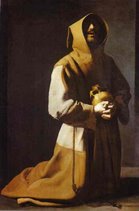A prologue to the discussion of Jacob
Isaac is the patriarch principally remembered for being conned by family members, twice. First, by his father to his near sacrifice (he even carried the wood); second, by his wife and younger twin son for the only thing an old man has left to give: his blessing.
Isaac is the patriarch principally remembered for being conned by family members, twice. First, by his father to his near sacrifice (he even carried the wood); second, by his wife and younger twin son for the only thing an old man has left to give: his blessing.
Compared to the chapters covering his father Abraham and his son Jacob, Isaac gets short shrift in the Bible. One rabbi wrote that his story is meant to indicate "continuity." Indeed, Isaac has a wife brought to him by his father's servant, he leaves for new land as his father did, he gets in a scuffle with a ruler for his wife, as his father did. He even re-digs his father's wells. His prayer comes in the afternoon (Genesis 24:64), neither the stand of his father at morning (Genesis 19:27) or the alertness of his son at night (Genesis 28:11). God gives him wealth and blessings, but his is a static personality in between that of two dynamos. What's up with Isaac?
We get a hint near the end of his life: his eyes are too dim to see (Genesis 27:1). According to Genesis Rabbah 65:6,
The binding of Isaac, the Akedah, then takes on new meaning: Isaac is not only physically bound onto the altar to be a sacrifice, but is henceforth psychologically bound. His vision, while still under formation, becomes trapped. He serves the Lord without rebellion and is successful, but he has no creative spirit to drive him into the spiritual territory of Abraham or Jacob. In some ways, he is a dead man walking. God even accounts for him as dead while he is still alive. When Rebekah meets him, she covers her head with a veil. While this is the tradition of marriage and modesty, it can also be read as covering one's self with a death shroud. The Hebrew word used -"she covered herself" - also means "she was buried." She dies to herself to live with a dying man.
In childhood, I had a book about female women of the Bible. In these girl-friendly tales, the marriage of Isaac and Rebekah is seen as a "happy" marriage, free of the conflict and turmoil that occurred in the households of Abraham and Jacob, who both took other wives/concubines. But a woman who dupes her blind husband in as elaborate a plot as Rebekah sets up and then stands watch to make sure Jacob receives the blessing isn't the happiest and most devoted of wives. Indeed, Rebekah cries, "Why am I here?"
P.S. An important point here: the God of the Old Testament, of Judaism, is not an arbitrary God. When St. Paul writes that God 'hated' Esau, one has to look at what Esau has done in his life. He takes an unbeliever as his wife; he "cares little for his birthright/ he despised his birthright." Esau chooses to be a hunter, forever wandering. Esau has earned God's disregard.

2 comments:
Everytime I have read Genesis, I have always gotten that same sense of Isaac being sandwiched between two more significant figures: Abraham and Isaac. Reading the rabbis seems to put some light on this subject. And of course, the Judeo-Christian mind has always focused on the fidelity of Abraham in sacrificing his son, while not considering what the effects would have been on the son himself. This is food for thought.
I wonder if there is a "spiritual" significance of this blindness; if the three patriarchs are an allegory for something else, more abstract.
You may find the following blog to be of interest:
Just Genesis
Ms. Linsley, "Jandy", is a former Episcopal priest who renounced her orders and converted to Eastern Orthodoxy.
Post a Comment